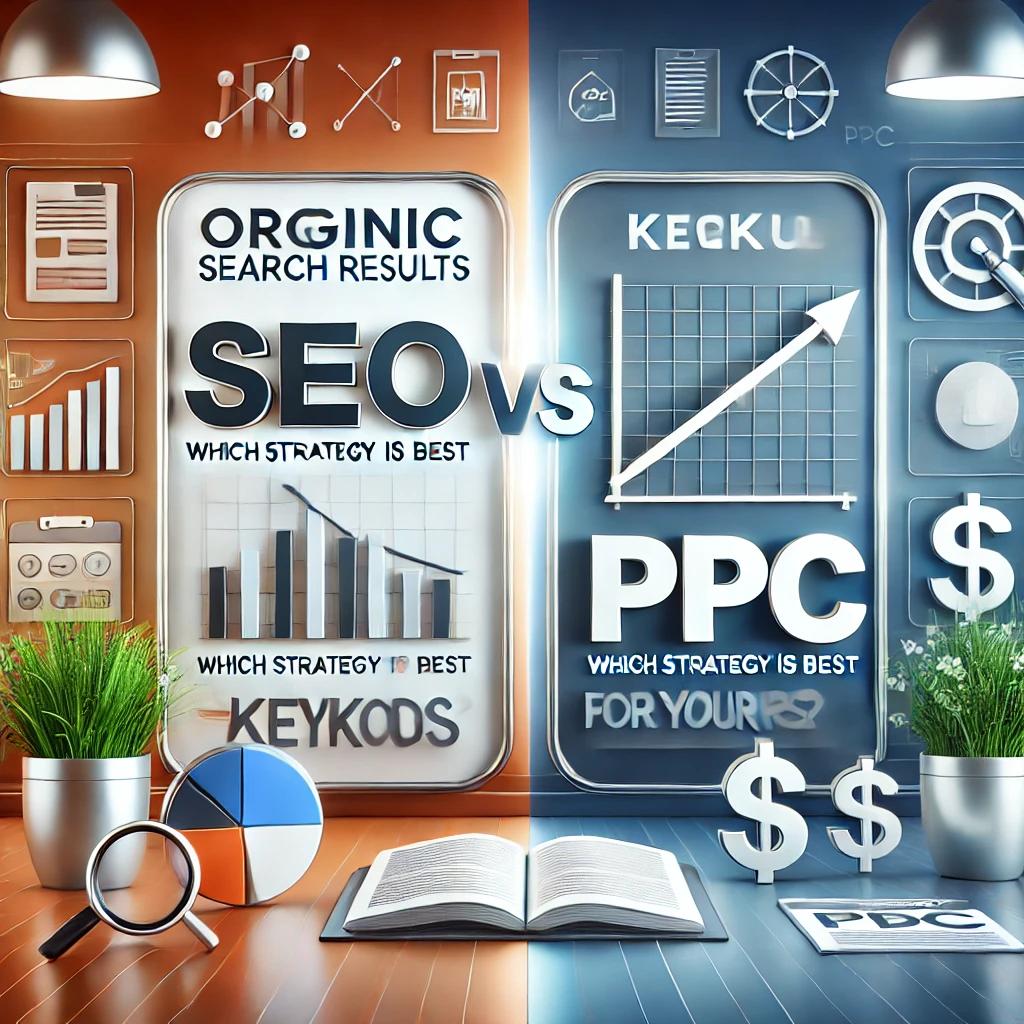
Understanding SEO and PPC
When it comes to driving traffic and boosting your online visibility, two key strategies dominate the digital marketing landscape: Search Engine Optimization (SEO) and Pay-Per-Click Advertising (PPC). While both aim to attract potential customers, they differ significantly in approach, cost, and effectiveness.
Choosing between SEO and PPC—or using a combination of both—depends on your business goals, budget, and target audience. This guide explores the advantages and challenges of each strategy to help you determine the best fit for your business.
What Is SEO?
SEO is the process of optimizing your website to rank higher in organic search engine results. This strategy involves creating high-quality content, building backlinks, and improving site structure to align with search engine algorithms. SEO is a long-term approach that focuses on driving consistent, sustainable traffic.
Key Benefits of SEO
- Cost-Effective: Unlike PPC, SEO doesn’t require ongoing payments for clicks, making it more affordable over time.
- Credibility and Trust: High organic rankings often signal trustworthiness and authority to users.
- Long-Term Results: Once established, your website can continue to attract traffic without additional investment.
Challenges of SEO
- Time-Consuming: Achieving significant results often takes months of consistent effort.
- Algorithm Changes: Search engine updates can impact your rankings, requiring ongoing optimization.
- High Competition: Competing for top rankings in competitive industries can be challenging.
What Is PPC?
PPC involves paying for ad placements on search engines or other platforms. Businesses bid on keywords, and their ads appear at the top of search results or on relevant websites. With PPC, you pay only when someone clicks on your ad, making it a performance-based model.
Key Benefits of PPC
- Immediate Results: PPC ads can start driving traffic as soon as they are live.
- Targeted Reach: Ads can be tailored to specific demographics, locations, and user behavior.
- Measurable Performance: Detailed analytics provide insights into ad performance and ROI.
Challenges of PPC
- Costly Over Time: The ongoing expense of ads can strain budgets, especially in competitive markets.
- Click Fraud: Competitors or bots may click on your ads, increasing costs without generating leads.
- Limited Longevity: Traffic stops as soon as you stop paying for ads.
Comparing SEO and PPC
Cost
SEO requires upfront investment in content creation and technical optimization but pays off with sustained traffic over time. PPC, on the other hand, offers instant results but involves ongoing expenses. For businesses with a tight budget, SEO may be more appealing in the long run, while PPC suits those needing immediate visibility.
Timeframe
SEO is a marathon, not a sprint. It takes time to build authority and achieve high rankings. Conversely, PPC delivers instant results, making it ideal for time-sensitive campaigns or product launches.
Scalability
PPC offers greater scalability, as you can increase your budget to drive more traffic instantly. SEO’s scalability is slower, relying on gradual improvements to your website’s rankings and domain authority.
Audience Targeting
PPC allows precise targeting based on keywords, demographics, and even behavior. SEO, while less customizable, attracts users searching for relevant information organically, potentially capturing high-intent leads.
When to Choose SEO
SEO is best for businesses seeking long-term growth and a sustainable online presence. If you operate in a niche with lower competition or have the time to invest in content and technical optimization, SEO can yield high returns over time.
When to Choose PPC
PPC is ideal for businesses needing quick results, such as promoting a limited-time offer or launching a new product. It’s also effective for highly competitive industries where organic rankings are difficult to achieve.
Integrating SEO and PPC for Maximum Impact
For many businesses, the best approach is a combination of SEO and PPC. Use PPC to drive immediate traffic and test keywords, then leverage those insights to refine your SEO strategy. By integrating both methods, you can achieve both short-term and long-term goals, maximizing your ROI.
Example: A Practical Strategy
Consider a new e-commerce brand. PPC campaigns can generate initial sales and brand awareness, while SEO efforts focus on building long-term visibility through blog content, product descriptions, and backlinks. Over time, as organic traffic grows, reliance on PPC can decrease, reducing costs.
Making the Right Choice for Your Business
Deciding between SEO and PPC ultimately depends on your business needs, budget, and timeline. Evaluate your goals and resources to determine the most effective strategy. For many businesses, a blended approach offers the best of both worlds—immediate impact with PPC and sustained growth through SEO.






